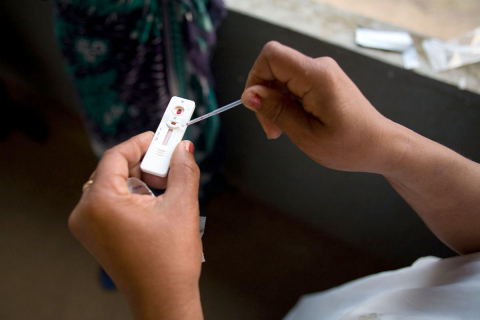Geneva, 19 June 2020 — In conjunction with the annual Rapid Diagnostic Test (RDT) Suppliers Forum convened by the World Health Organization (WHO) this week, the RBM Partnership to End Malaria is calling on governments, manufacturers and procurement partners
to take action to ensure continued availability and affordability of life-saving malaria intervention tools.
Since 2000, the development and scale-up of an array of innovations – including long-lasting insecticide nets and indoor residual spraying, RDTs, and a new generation of antimalarials known as Artemisinin-based Combination Therapies (ACTs) – helped save 7 million lives from malaria and prevent more than 1 billion new infections.
However, more than four months since the WHO declared COVID-19 a pandemic, global health product supply chains and distribution across the full product lifecycle are being disrupted. Lockdown measures introduced around the globe have impacted the production and delivery of life-saving malaria commodities, leading to critical delays ahead of the high-transmission rainy season. Furthermore, the pandemic has accelerated demand for COVID-19 diagnostic tests and potential new COVID-19 therapies; this has impacted malaria by creating potential shortages and price hikes for malaria RDTs and Active Pharmaceutical Ingredients used in malaria medicines.
On 16 June, UN agencies, international partners and 12 manufacturers of RDTs convened for the RDT Suppliers Forum to mitigate the supply risks for malaria diagnostics created by the COVID-19 pandemic. Participants shared the 2020 forecasts indicating an immediate need for additional 105 million malaria RDTs this year and discussed longer-term measures to ensure continued availability of malaria diagnostics. To avoid risks of stockouts, the three largest public procurers of RDTs (US President’s Malaria Initiative, the Global Fund and UNICEF) have decided to float tenders to fill urgent needs for 2020 and 2021.
Recent WHO modelling predicts malaria deaths could potentially double this year to nearly 800,000 as a result of COVID-19, if distribution of long-lasting insecticide treated nets and access to testing and treatment of malaria are severely disrupted. African countries, which account for 90% of the global malaria burden, are particularly dependent on imported products and vulnerable to disruptions to product supply chains and national distribution systems triggered by COVID-19.
If not addressed now, reductions in the availability of these tools this year also will have long-term impact on countries’ ability to advance progress and achieve global malaria elimination goals.
To prevent the impending crisis, the RBM Partnership urges government, private sector and international partners to stay committed to the malaria fight for the immediate future as well as the long-term.
1. Maintain and step up commitments across the private sector
Importantly, the private sector must maintain existing commitments to manufacture antimalarial medicines, diagnostics and preventive vector control tools despite emerging pressures to prioritise new COVID-19 production opportunities. New private sector partners around the world are also encouraged to step up the fight against malaria by entering the essential commodities market. In the longer-term, private sector engagement in the development and scale up of further innovative tools and technologies will be critical to beat malaria and other deadly diseases, particularly in the context of emerging resistance to drugs and insecticides.
2. Minimise production and delivery delays and bottlenecks
Governments of countries which manufacture important malaria commodities must minimise any disruption to their production and transportation as a result of COVID-19 restrictions. As funding and procurement cycles often synchronise with the seasonality of malaria, lead times are often tight, so recipient countries must equally strive to eliminate delays to the clearance, warehousing, across-country transport and local delivery of these commodities. Malaria-affected countries should also consider sourcing malaria tools closer to home, or to prioritise domestic production of key commodities to boost accessibility and local economic activity.
3. Improve coordination between global manufacturing, procurement and delivery partners
The global malaria community—including procurement and manufacturing partners and health officials—must be even more coordinated to ensure commodities are delivered in a timely manner against the backdrop of COVID-19. To help manufacturers respect their commitments in this fast-moving environment, donors, procurement agencies, and global and national health authorities should consider new mechanisms to secure stronger production and supply; this may include broader use of strategic stockpiles to help reduce the impact of extraordinary supply chain disruptions to prevent sudden changes in demand.
Dr Abdourahmane Diallo, CEO, RBM Partnership to End Malaria, comments:
“Tremendous progress against malaria was possible thanks to the long-term commitment of industry, government and partners working together to develop and scale up innovative life-saving tools. We call on all partners to stay in the fight, even in the face of COVID-19, to protect the lives of millions at risk of malaria and ensure we finish what we started together, ending malaria and overcoming new threats to global public health.”
Caroline Desrousseaux, Chair, Business Alliance Against Malaria (BAAM), adds:
“We can and will fight COVID-19 and malaria at the same time—it is not only possible, but necessary. The Business Alliance Against Malaria believes that it is within the global malaria community’s power to rewrite the narrative to ensure service and supply continuity. For this to happen, it is critical that the community engages with private sector in a spirit of partnership to address bottlenecks, provide long-term visibility on the needs and create the correct incentives. Doing so will avert excess malaria infections and deaths and maintain momentum toward the ultimate goal of ending malaria. Interventions such as the mass distribution of insecticide treated nets and Artemisinin-based Combination Therapies have a long history of making a critical impact in the fight against malaria—allowing the COVID-19 pandemic to disrupt these distribution campaigns would be disastrous.”
